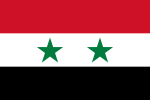| Part of a series on the |
| Culture of Syria |
|---|
 |
| History |
| People |
| Languages |
| Cuisine |
| Religion |
| Art |
| Literature |
| Music |
| Sport |
The mass media in Syria consists primarily of television, radio, Internet, film and print. The national language of Syria is Arabic but some publications and broadcasts are also available in English and French.[1] While television is the most popular medium in Syria, the Internet has become a widely utilized vehicle to disseminate content. Transcending all available media, the government seeks to control what Syrians see by restricting coverage from outside sources.[2] Publications and broadcasts are monitored by members of the government.[1] All mass media outlets are under the supervision of the Ministry of Information. Third article of the 2013 Information Ministry guidelines stipulate that purpose of all media outlets is "to enlighten public opinion" in line with the ideological doctrines "of the Arab Socialist Ba’ath Party and the policy of the state".[3]
Following Ba'ath party's capture of power in 1963, the state immediately banned all news outlets except which advanced party propaganda. Syrians have had no exposure to free media or independent press since then, with there being no space for independent journalism, newspapers, publications, journalists or websites un-affiliated with party organizations. The situation has only worsened since 1970, with the Ba'athist dictatorship imposing additional censorship policies that furthered its totalitarian control of the society.[4] State propaganda machine is primarily used to monopolise information access and indoctrinate the Syrian population in Ba'athist ideology.[5]
Syria is one of the most dangerous places in the world for journalists and is ranked 2nd worst in the World Press Freedom Index.[6][7] There were 28 journalists killed in combat in 2012.[8] Between 2011 and 2020, more than 700 civilian journalists have been executed in Syria and 78% of them are estimated to have been to death by Ba'athist forces. More than 400 journalists were arrested or kidnapped in the course of the Syrian civil war. More than a third of independent journalists reporting on the war has been forced to flee, following government capture of territories in Southern and Eastern Syria during 2016-2018.[9][10] There has been a mass flight of local journalists due to persecution, threats, harassment, torture, executions and kidnappings from the islamist militias. Syria has numerous laws such as "1965 law of protection against the revolution", "2011 media law", "2012 terrorism law", "2021 cybercrime law" which enables the government to formally indict journalists and give a legal cover to media censorship.[11]
- ^ a b European Neighborhood Journalism Network (n.d.). "Syria-media profile". European Neighborhood Journalism Network. Archived from the original on 9 October 2012. Retrieved 30 March 2013.
- ^ Nick Sturdee (10 February 2013). "BBC documentary examines Syria's state TV channel al Ikhbariya". TheGuardian.com. The Guardian. Retrieved 30 March 2013.
- ^ Sadiki, Larbi; Fares, Obaida (2014). "15: Pro-Regime versus Oppositional Media: During the Revolution, 2011–2013". Routledge Handbook of the Arab Spring: Rethinking Democratization. Routledge. pp. 188, 189. ISBN 978-0-415-52391-2.
- ^ "On World Press Freedom Day: The Annual Report on the Most Notable Violations Against Media Workers in Syria". OCHR: Reliefweb. 3 May 2023. Archived from the original on 8 May 2023.
- ^ "Syria". Reporters Without Borders. 2023. Archived from the original on 8 May 2023.
- ^ "Syria". Reporters Without Borders. 2024. Archived from the original on 9 May 2024.
- ^ "Syria ranks second to last in RSF's press freedom index". Enab Baladi. 3 May 2024. Archived from the original on 3 May 2024.
- ^ "Country profile: Syria". BBC News. 30 January 2013.
- ^ "Toll of ten years of civil war on journalists in Syria". Reporters without Borders. 12 March 2021. Archived from the original on 21 June 2022.
- ^ "707 Citizen Journalists Killed Since March 2011 to Date, 78% by Syrian Regime Forces". 3 May 2020. Archived from the original on 18 June 2022.
The report notes that 707 citizen journalists have been killed since March 2011 to date, 78% of them by Syrian Regime forces.
- ^ "Syria". Reporters Without Borders. 2023. Archived from the original on 8 May 2023.
The regime treats the media as a tool for disseminating Baathist ideology and excludes any form of pluralism, driving many journalists into self-imposed exile...During the initial anti-government protests, the government banned international media outlets and freelancers from entering the country...with the risks of arrest, abduction, torture or murder, Syrian journalists are often forced to flee the country to escape mistreatment or death.